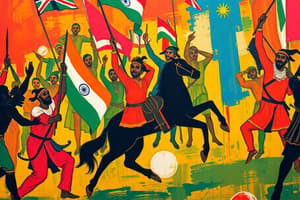Podcast
Questions and Answers
What were some of the economic grievances that contributed to the Revolt of 1857?
What were some of the economic grievances that contributed to the Revolt of 1857?
Increased taxes and restrictions on trade
Why did the introduction of new cartridges for rifles cause controversy among Indian soldiers?
Why did the introduction of new cartridges for rifles cause controversy among Indian soldiers?
The cartridges had grease derived from cows and pigs, which conflicted with religious beliefs of some soldiers
Where did the revolt of 1857 begin?
Where did the revolt of 1857 begin?
Meerut
Who emerged as a prominent leader during the revolt of 1857 and was known as the queen of Jhansi?
Who emerged as a prominent leader during the revolt of 1857 and was known as the queen of Jhansi?
Which Brahmin leader from Kanpur was involved in the revolt of 1857?
Which Brahmin leader from Kanpur was involved in the revolt of 1857?
Which Muslim nobleman from Awadh played a role in the Revolt of 1857?
Which Muslim nobleman from Awadh played a role in the Revolt of 1857?
What were some reasons for the failure of the revolt of 1857?
What were some reasons for the failure of the revolt of 1857?
Name some key battles fought during the Revolt of 1857.
Name some key battles fought during the Revolt of 1857.
What impact did the Revolt of 1857 have on British rule in India?
What impact did the Revolt of 1857 have on British rule in India?
How did the British respond to the Revolt of 1857?
How did the British respond to the Revolt of 1857?
Study Notes
The Revolt of 1857: Causes, Events, Leaders, Impact, British Response
Causes
The Revolt of 1857, often called the Indian Rebellion or the First War of Independence, stemmed from various factors including economic grievances, disillusionment among Indian soldiers, and religious tensions. Economic issues included increased taxes and restrictions on trade. Additionally, the introduction of new cartridges for rifles that had grease derived from cows and pigs caused controversy among separony soldiers due to religious concerns. These factors combined to create a powder keg of resentment and anger towards British rule.
Events
The revolt started as a mutiny of Indian soldiers, known as sepoys, in the British East India Company's Army at Meerut on May 10, 1857. News of the rebellion sparked further unrest across northern India, leading to violent clashes between Indian factions and British forces. Key battles were fought at places like Cawnpore, Lucknow, and Delhi. Despite initial successes, the revolt ultimately failed due to internal divisions among the rebels, lack of coordination, and superior British firepower.
Leaders
Rani Lakshmi Bai, the queen of Jhansi, emerged as a prominent figurehead for the rebellion, leading the charge alongside her son. Other notable figures involved in the revolt included Nana Saheb, a Brahmin leader from Kanpur, and Bakht Khan, a Muslim nobleman from Awadh. While these individuals played significant roles in rallying support and organizing resistance, the revolt itself did not have a single leader controlling all factions.
Impact
The suppression of the revolt took almost a year to complete, costing thousands of lives and causing extensive damage to infrastructure and property. The British responded by imposing martial law throughout affected regions. Aside from the immediate consequences, the revolt marked a turning point in British-Indian relations. It accelerated the process of consolidating British rule through the creation of the Crown Presidencies and eventually led to the establishment of the British Raj, which lasted until India gained independence in 1947.
Studying That Suits You
Use AI to generate personalized quizzes and flashcards to suit your learning preferences.
Description
Learn about the causes, events, key leaders, and impact of the Revolt of 1857 in India, also known as the Indian Rebellion or the First War of Independence against British rule. Explore the economic, social, and religious factors that led to the uprising, significant events during the revolt, influential leaders like Rani Lakshmibai and Nana Saheb, and the lasting consequences on British-Indian relations.




